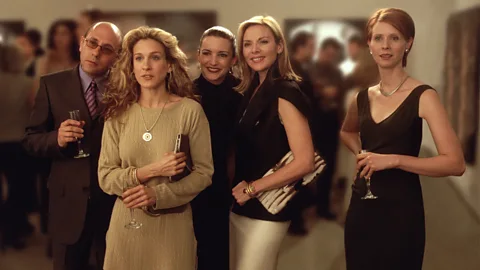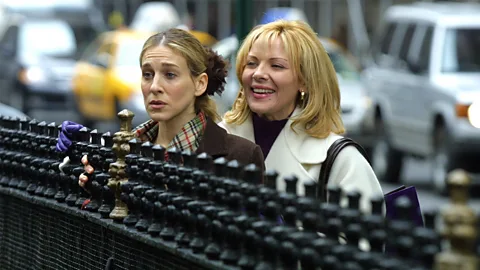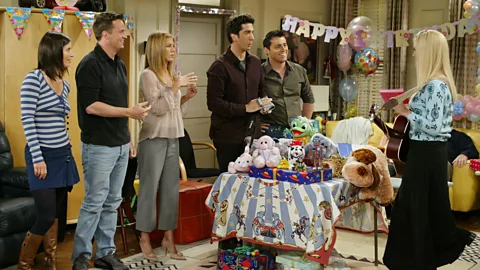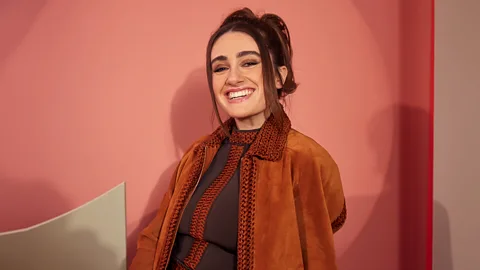What will Gen Z make of Sex And The City, now it's on Netflix?
 Getty Images
Getty ImagesThe classic HBO show about four female friends has landed on the streaming platform in the US, where, like Friends, it may win legions of new, younger fans – and provoke them too.
And just like that; 26 years after it premiered, the entire six series of Sex And The City landed yesterday on Netflix in the US for the first time.
The hit HBO comedy-drama, based on Candace Bushnell's anthology of her newspaper columns, struck an instant chord with late-90s TV audiences. Its ground-breaking depiction of four friends – Carrie Bradshaw (Sarah Jessica Parker), Miranda Hobbs (Cynthia Nixon), Samantha Jones (Kim Cattrall) and Charlotte York (Kristin Davis) – showed successful, intelligent women in their 30s and 40s, living, working and navigating the dating world in New York.
 Getty Images
Getty ImagesWhile such a plot may not sound groundbreaking now, at the time, almost three decades ago, it was. To have frank, feminist and wickedly funny women, discussing some usually taboo aspects of women's sex lives so openly on primetime was – with apologies to that other great show about a female quartet before it, The Golden Girls – pioneering.
Now with it being shown on the streaming platform, there's the chance for it to attract a huge audience all over again – for old fans to revisit it, and new, younger ones to discover what it's like to be broken up with by a Post-It note; what being "trisexual" is; and of course, the terrible consequences of dramatically smoking a cigarette near a high-rise window.
The 90s sitcom Friends gained an incredible second life with Gen Z when it hit the streamer in the US in 2015, and the UK in 2018, becoming the most watched TV show in Britain that year. So is SATC in line for a similar reevaluation by a new, younger generation who didn't see it the first time around, and what will they make of the show when viewed through a 2024 lens?
Its current reputation with Gen Z
In fact, many Gen Z-ers won't be coming to it completely fresh, with some saying that a show that began airing before they were born is nevertheless already part of their own cultural consciousness. "Throughout my life, SATC references have repeatedly featured," Estelle Bolon, 23, tells the BBC. "When someone loves the show, you know it; [Carrie's catchphrase] 'and just like that…' will be dropped into conversations; her signature flower brooch pinned to a blazer, or a Cosmopolitan ordered as a first ever cocktail."
Many from this generation will have likely first stumbled upon the series online, on social media, where key moments are turned into popular memes. These hit their peak around 2018, when The Cut commented in a collection of the best selection: "Something about the show's wry humour and early-aughts fashion makes it ripe for internet jokes."
"Oh, Gen Z have already discovered SATC," says millennial journalist Evan Ross Katz, who has watched the full series "six or seven times", and discussed it at length on his podcast and in his newsletter. "It circulates on TikTok and I see Miranda and Samantha in particular getting a lot of love on socials; then people love to hate on Carrie Bradshaw – unfairly so, I think!
"But I think the series moving to Netflix might provide an opportunity for expansive context because so much of SATC in the 2020s has lived on through memes or clips or gifs and now hopefully people might be able to round out their perspective on things.
 Getty Images
Getty ImagesHowever, despite the Darren Star and Michael Patrick King series having a cultural impact in respect of everything from feminism to fashion, it also came in for its fair share of criticism. As well as fetishising and heavily pushing consumerism, here was a series based in one of the most multicultural cities in the world, which nevertheless overwhelmingly featured white, privileged people, and which was peppered with racially insensitive language, such as Carrie's voiceover stating that Sum, an east Asian household worker "wasn't so dim, that Sum".
Other crass comments were offensive to the LGBTQ+ community, such as Carrie telling her friends that "I'm not even sure bisexuality exists. I think it's just a layover on the way to Gaytown", or Samantha bemoaning of the trans sex workers outside her penthouse apartment: "I am paying a fortune to live in a neighbourhood that's trendy by day, and tranny by night".
Kareem Belfon, 27, says he's "relatively new" to SATC, watching it for the first time in 2022, but he's a big fan, and he even tunes into three of the biggest SATC themed podcasts: So I Got To Thinking, Every Outfit, and Sentimental in the City. But despite his deep affection for the show, it also has some glaring limitations for him. "The show had no idea how to talk about race," he says. "And when it did, it was mortifying. When a person of colour would appear, they were shown as crude stereotypes, fetishised, or played for laughs. Watching the show with 2024 eyes, I'm used to watching TV shows that show rich, white characters and their White Mess (The White Lotus, Big Little Lies, Succession), but it's clear that SATC had no intention of portraying people of colour with any sensitivity."
More like this:
Estelle feels the same: "It's frustrating to see characters who can be so inspiring and entertaining suddenly use language that would never be deemed acceptable now, completely 'othering' a group of people."
Interestingly, some of these problematic statements have been retroactively corrected by the audience itself, again through the device of memes – see 2015's #WokeCharlotte craze, in which stills of offending scenes were newly mocked up with Charlotte calling out her friends' misspoken words.
However, as Katz suggests, the fact that it has dated in some aspects, as all shows do, does not invalidate its enduring strengths. "People saying SATC is problematic upon rewatch, sure, they're not wrong," he says. "But I think that discounts all the things that remain very much fresh within the show… [In many other ways] the show was incredibly progressive at the time, and remains so today."
Eyebrow-raising elements
As the title obviously suggests, sex in the series features frequently. But with under 30s reported to be having less sex, and half of Gen Z viewers in a recent UCLA study saying they wanted "less sex on screen" will the series be too scandalous for them? "There's been a lot of conversation about the prudish nature of this generation," suggests Katz, "So perhaps the sex might shock them. But I don't think it's that 'sexy' of a show, as the sex is often played for laughs."
More likely to raise eyebrows is the amount of characters smoking cigarettes and the heavy drinking culture on the show, with young adults now reportedly preferring to drink less than older generations. But the biggest culture shock of them all could be the characters actually having the money to pay for round upon round of Cosmos and frequent brunches and lunches in fancy restaurants, as people of all ages struggle with a cost of living crisis. "New viewers could see the show as aspirational escapism," Kareem suggests, "as opposed to an accurate portrayal of lived experiences. But then again, I question whether Carrie Bradshaw, a woman who spent $40,000 on shoes, was ever in any way relatable to anyone?"
 Getty Images
Getty ImagesEstelle, who watched SATC for the first time in 2023 on the recommendation of a friend, adds: "I liked it for its sense of fun, the fashion, the whimsical narration and spotlighting the significance of friendship. However, I definitely wouldn't disagree with someone if they didn't like SATC – aside from problematic moments, some people just can't stand Carrie, and that's fair enough, she's pretty selfish!"
The divisive character of Carrie always caused debate, but it seems to have only intensified with time, as some of her behaviour – especially towards her friends – is truly indefensible. However, as suggested Emily Nussbaum in a famous New Yorker essay back in 2013, her evident flaws were always part of the show's point – Nussbaum called her the "unacknowledged first female anti-hero" – and key to its complexity.
"Carrie Bradshaw will always be iconic, even when she's being slightly insufferable," says Kareem, who has also watched the two series so far of its divisive sequel And Just Like That…, and plans to watch the original as soon as it appears on the streamer again. "What I love about the show in general is that it feels like a time-capsule of sex and dating before social media and dating apps, but the themes they cover are timeless."
As to whether SATC will repeat the success of Friends on Netflix – a show that has also latterly been called out for "problematic" scenes, none of which criticism stopped it getting huge ratings? Both Estelle and Kareem are confident that Carrie, Samantha, Charlotte and Miranda will be a hit, though perhaps not quite on the scale of the Central Perk sextet. "I did watch Friends when it came to Netflix, and still do," says Estelle. "It's hard to tell how something will be received when it reaches a new audience but I think SATC definitely has the potential to hold similar appealing elements as Friends. I probably won't watch it again straight away, but I'm sure it will make its way onto my 'comfort watching list' at some point."
Kareem suggests it has an advantage over Friends with one demographic certainly, in that it connects more with gay culture. "I think I'm the only person alive that has never watched an episode of Friends," he says. "Sex and the City is just more chic. Plus, most of my gay friends have already watched it; it's pretty much essential viewing."
Indeed, you only have to look at the recent "renaissance" for Lena Dunham's Girls, often dubbed SATC's successor, to see that there's a taste for reassessing shows that once surfed the zeitgeist. However, that's not to say there's no space for Gen Z's own new examination of a group of quarter-life friends in the big city. Just this month, HBO announced it had commissioned Bottoms star Rachel Sennott to write a pilot for a series about "a codependent friend group [who] reunites, navigating how the time apart, ambition and new relationships have changed them".
How much of a line will be traced back to SATC in Sennott's show remains to be seen, but Katz says the key legacy of Sex and the City that he hopes is passed on to Gen Z, and its TV makers, is how it treated the viewer: "I feel SATC does such a great job of accepting the intelligence of the viewer. I don't think it hand holds in any way, and is so unabashed in its character and plot points. I'm excited for Gen Z to fall in love with it the same way I did."
--
If you liked this story, sign up for The Essential List newsletter – a handpicked selection of features, videos and can't-miss news delivered to your inbox every Friday.
